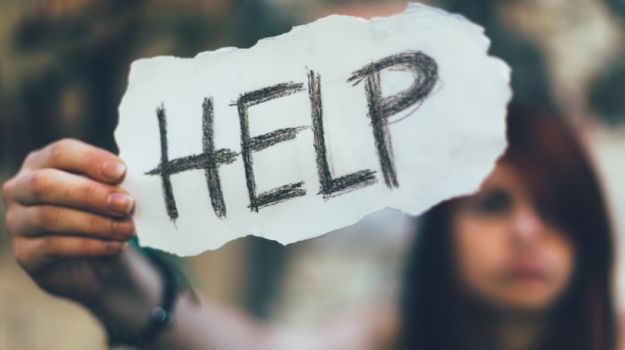Helping a someone who cuts or self-harms
Perhaps you've noticed suspicious injuries on someone close to you, or that person has admitted to you that they're cutting. Whatever the case, you may be feeling unsure of yourself. What should you say? How can you help?
Deal with your own feelings. You may feel shocked, confused, or even disgusted by self-harming behaviors—and guilty about admitting these feelings. Acknowledging your feelings is an important first step toward helping your loved one.
Learn about the problem. The best way to overcome any discomfort or distaste you feel about self-harm is by learning about it. Understanding why your loved one is self-injuring can help you see the world through their eyes.
Don’t judge. Avoid judgmental comments and criticism—they’ll only make things worse. Remember, the self-harming person already feels distressed, ashamed and alone.
Offer support, not ultimatums. It’s only natural to want to help, but threats, punishments, and ultimatums are counterproductive. Express your concern and let the person know that you’re available whenever they want to talk or need support.
Encourage communication. Encourage your loved one to express whatever they're feeling, even if it’s something you might be uncomfortable with. If the person hasn’t told you about the self-harm, bring up the subject in a caring, non-confrontational way: “I’ve noticed injuries on your body, and I want to understand what you’re going through.”
If the self-harmer is a family member, prepare yourself to address difficulties in the family. This is not about blame, but rather about communicating and dealing with problems in better ways that can benefit the whole family.
Resources and references
Cutting – Article written for teens explains what cutting is, why people do it, how it starts, and where to go for help. (Nemours Foundation)
About Self-Harm: Why You Self-Harm and How to Seek Help – Get the facts about cutting and self-injury. Learn what purpose it serves and how you can overcome it. (Mind)
Self-Harm – Introduction to self-harm, including what makes people do it, danger signs, treatment, and things you can do to help yourself. (Royal College of Psychiatrists)
How Can I Stop Cutting? – Offers strategies for resisting the urge to cut by planning ahead, distracting yourself, and finding other ways to express your feelings. (Nemours Foundation)
Reducing and Stopping Self-Harm – Explore the reasons you want to stop injuring yourself, examine the reasons behind your behavior, and learn how to stop, as well as deal with slip-ups. (Scar Tissue)
Coping Skills – Learn the coping skills that worked for one former self-injurer. Includes coping skills for staying in the present, for general wellness, and for replacing cutting. (Psyke.org)
Cutting and self-harm helplines
S.A.F.E. Alternatives (Self-Abuse Finally Ends) – Organization dedicated to helping people who self-harm, with a U.S. helpline at 1-800-366-8288. (S.A.F.E. Alternatives)
Mind Infoline – Information on self-harm and a helpline to call in the UK at 0300 123 3393 or text 86463. (Mind)
Kids Help Phone – A helpline for kids and teens in Canada to call for help with any issue, including cutting and self-injury. Call 1-800-668-6868. (Kids Help Phone)
Kids Helpline – A helpline for kids and young adults in Australia to get help with issues including cutting and self-harm. Call 1800 55 1800. (Kids Helpline)
How Can I Help a Friend Who Cuts? – A guide for teens who are concerned about a friend who they learn is self-harming (Nemours Foundation)
Guidance for others – Series of downloadable factsheets with tips on how friends and family members can help someone who cuts or self-harms. (LifeSigns)
- Abuse & The Abuser
- Achievement
- Activity, Fitness & Sport
- Aging & Maturity
- Altruism & Kindness
- Atrocities, Racism & Inequality
- Challenges & Pitfalls
- Choices & Decisions
- Communication Skills
- Crime & Punishment
- Dangerous Situations
- Dealing with Addictions
- Debatable Issues & Moral Questions
- Determination & Achievement
- Diet & Nutrition
- Employment & Career
- Ethical dilemmas
- Experience & Adventure
- Faith, Something to Believe in
- Fears & Phobias
- Friends & Acquaintances
- Habits. Good & Bad
- Honour & Respect
- Human Nature
- Image & Uniqueness
- Immediate Family Relations
- Influence & Negotiation
- Interdependence & Independence
- Life's Big Questions
- Love, Dating & Marriage
- Manners & Etiquette
- Money & Finances
- Moods & Emotions
- Other Beneficial Approaches
- Other Relationships
- Overall health
- Passions & Strengths
- Peace & Forgiveness
- Personal Change
- Personal Development
- Politics & Governance
- Positive & Negative Attitudes
- Rights & Freedom
- Self Harm & Self Sabotage
- Sexual Preferences
- Sexual Relations
- Sins
- Thanks & Gratitude
- The Legacy We Leave
- The Search for Happiness
- Time. Past, present & Future
- Today's World, Projecting Tomorrow
- Truth & Character
- Unattractive Qualities
- Wisdom & Knowledge





Comments